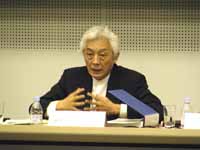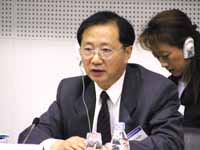Summary
Asia specialists from Japan and overseas gathered on April 22 and 23 for a two-day symposium which was held at United Nations University in Tokyo, to discuss the ongoing changes and economic integration in Asia, including the growth of China and its implications to the region.
"De facto market integration" is beginning to take place in Asia.
--- AOKI Masahiko (President and CRO, RIETI / Professor, Stanford University)

Though lagging behind Europe and North America in terms of formal economic and political arrangements for market integration, Asian economies are becoming more and more tightly connected in trade and investment, Aoki said, pointing to the high growth of China as a key driving force.
He said that East Asia, as a whole, is now in the process of "great institutional transformation" with Japan, China and South Korea - each in a different stage of development - undergoing changes at a different pace.
Although some consider Japan's prolonged stagnation as a break on further market integration, Aoki said he see things differently. He said that the ongoing stagnation is a symptom arising from "significant institutional transition that Japan has entered in an age of closer international interactions." And such institutional changes, if it moves in right direction, will facilitate stable and efficient economic integration in East Asia, and conversely, the ongoing market integration will induce Japan to pursue further institutional changes to a more open system, he said.
"Japan is bound to be forced into exploring new institutional arrangements in the context of the emergent Asian market integration," he said.
Asia is putting forward an alternative to this particular American dominance structure
--- Joseph E. STIGLITZ (Professor, Columbia University)

"The end of the Cold War !A resulted in a single super military power. Of course the existence of a single military power does not necessarily translate into a dominant economic power. But there are clearly important relationships between that military presence and the consequence in the political and economic sphere," he said, citing the rise of "American unilateralism." Using its position as global political leadership, Stiglitz said, the U.S. has been pushing a particular perspective on economic and political issues as seen in the U.S. Treasury Department's rejection of a proposed idea of Asian Monetary Fund, which he said would have given a quicker remedy to the Asian currency crisis. "American dominance in international economic institution is being used to promote a particular view of the market economy, the view which have many deficiency in it," he said. "Asia is putting forward an alternative to this particular structure." Stiglitz said that the existing dollar-based global reserve system benefits the U.S. whereas developing countries bear disproportionately heavy burden stemming from volatility in currency market.
An emerging "Asian Monetary Arrangement," shared currency reserves with no fixed exchange rates, however, can be an alternative economic model, providing a good basis for a new global regime.
As another sign of changes, Stiglitz pointed to the Doha round of trade talks, which he said is meant to be a "developing round" based on the growing skepticism of the Uruguay Round, which many people begin to see resulted in the current inequities in global economic system.
He said that Asia should take unified stance in bargaining with the U.S. but it has to go beyond narrow self-interest and advocate interest more broadly for developing countries.
By literally "extending everything but arms" to the poorest countries, Asia can demonstrate to the world a kind of leadership that is so lacking in North America, setting a right example for the U.S. and others.
Regional economic integration brings a series of benefits, such as efficient allocation of resources and technological progress
--- CHEN Qingtai (Vice President, Development Research Center of the State Council of the PRC)

"To develop its economy, a nation needs not only to mobilize its domestic resources but also to utilize international resources. Participation in the international division of labor helps a country improve its productivity," he said. Meanwhile, he said, many of the challenges arising from WTO membership are problems China must solve for its economic growth and social development. He said that China should take a "proactive strategy" that is to take up the challenges as the motive force and opportunities for deepening reform and accelerating industrial restructuring.
As to the implication of China's growth, Chen said, China's growth is not a threat but complementary to Japan and other Asian countries, which are in different stage of development.
"The economic and trade relationship between China and the rest of Asia is predominantly one of cooperation based on mutual economic complementarities and mutual benefit, not one of competition and antagonism," he said. "The development of China's processing trade will give impetus to the rapid development of its import, especially from other Asian countries." Chen also said that regional economic integration brings a series of benefits, such as efficient allocation of resources and greater competitions that promote technological progress.
Although a free trade zone is not possible within a short period of time, a good start can be made now by facilitating trade and investment, which he said would enable Asian economies to make use of each other's advantages to offset their own disadvantages.
"To cope with the trade and investment liberalization around the globe and the tendency to establish regional blocks, it is necessary for Asia to strengthen regional economic cooperation and promote regional trade and investment liberalization as its long-term objectives," he said.

